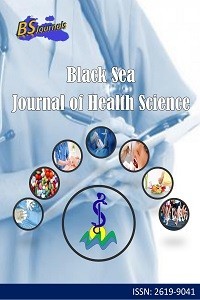Investigation of the Effect of Emotional Freedom Technique on Stress and Anxiety in Nursing Students in the Covid-19 Pandemic
Emotional freedom technique, Anxiety, Stress, Complementary therapies
Investigation of the Effect of Emotional Freedom Technique on Stress and Anxiety in Nursing Students in the Covid-19 Pandemic
Emotional freedom technique, Anxiety, Stress, Complementary therapies,
___
- Benor DJ, Ledger K, Toussaint L, Hett G, Zaccaro D. 2009. A Pilot study of emotional freedom techniques, wholistic hybrid derived from eye movement desensitization and reprocessing and emotional freedom technique, and cognitive behavioral therapy to treat test anxiety in university students. Explore, 5(6): 338-340.
- Both, E, Stewart A, Carrier A. 2013. Tapping for success: A pilot study to explore if emotional freedom techniques (EFT) can reduce anxiety and enhance academic performance in university students. Innov Pract Higher Educat, 1(3): 1-13.
- Chatwin H, Stapleton P, Porter B, Devine S, Sheldon T. 2016. The effectiveness of cognitive-behavioral therapy and emotional freedom techniques in reducing depression and anxiety among adults: a pilot study. IMCJ, 15(2): 27-34.
- Church D, Brooks AJ. 2010. Application of emotional freedom techniques. Integrat Med, 9(4): 47-48.
- Church D, De Asis MA, Brooks AJ. 2012. Brief group intervention using emotional freedom techniques for depression in college students: a randomized controlled trial. Depress Res Treat, 2012: 257172.
- Cloud M. 2016. Emotional freedom techniques for anxiety: a systematic review with meta-analysis. J Nerv Ment Dis, 204(5): 388-395.
- Dincer B, Inangil D. 2021. The effect of Emotional Freedom Techniques on nurses' stress, anxiety, and burnout levels during the COVID-19 pandemic: A randomized controlled trial. Explore, 17(2): 109-114.
- Dincer B, Özçelik SK, Özer Z, Bahçecik N. 2020. Breathing therapy and emotional freedom techniques on public speaking anxiety in Turkish nursing students: A randomized controlled study. Explore, 18(2):226-233.
- Eraydin C, Alpar SE. 2022. The effect of laughter therapy on nursing students' anxiety, satisfaction with life, and psychological well-being during the COVID-19 pandemic: Randomized controlled study. Advan Integ Med, 9(3): 173-179.
- Gaesser AH, Karan OC. 2017. A randomized controlled comparison of Emotional Freedom Technique and Cognitive-Behavioral Therapy to reduce adolescent anxiety: A pilot study. J Altern Complement Med, 23(2): 102-108.
- Ghamsari MS, Lavasani MG. 2015. Effectiveness of emotional freedom technique on pregnant women's perceived stress and resilience. J Educat Sociol, 6(2): 118-22.
- İnangil D, Vural PI, Doğan S, Körpe G. 2020. Effectiveness of music therapy and emotional freedom technique on test anxiety in Turkish nursing students: a randomized controlled trial. Eur J Integr Med, 33:101041.
- Öner N, Le Compte WA. 1985. Durumluk-sürekli kaygı envanteri el kitabı. Boğaziçi Üniversitesi Yayınları, İdtsnbul, Türkiye, 2. Baskı, ss. 26.
- Ozamiz-Etxebarria N, Santa-Maria M, Eiguren-Munitis A, Gorrotxategi P. 2020. Reduction of COVID-19 anxiety levels through relaxation techniques: A study carried out in northern Spain on a sample of young. Frontiers Psycol, 11: 1-6.
- Patterson SL. 2016. The effect of emotional freedom technique on stress and anxiety in nursing students: A pilot study. Nurse Educ Today, 40: 104-110.
- Rancour P. 2017. The emotional freedom technique: finally, a unifying theory for the practice of holistic nursing, or too good to be true? J Holist Nurs, 35(4): 382-388.
- Şahin NH, Durak A. 1995. Stresle başa çıkma tarzları ölçeği: Üniversite öğrencileri için uyarlanması. Türk Psikol Derg, 10(34): 56-73.
- Sezgin N. 2017. Tek oturumda uygulanan duygusal özgürlük tekniği (EFT)'nin yaratılan stres durumu üzerindeki etkileri. Ankara Üniv Dil Tarih-Coğrafya Fak Derg, 53(1): 1-7.
- Stapleton P, Crighton G, Sabot D, O'Neill HM. 2020. Reexamining the effect of emotional freedom techniques on stress biochemistry: A randomized controlled trial. Psychol Trauma, 12(8): 869-877.
- Torabizadeh C, Bostani S, Yektatalab S. 2016. Comparison between the effects of muscle relaxation and support groups on the anxiety of nursing students: a randomized controlled trial. Complement Ther Clin Pract, 25: 106-113.
- Vatan F, Avdal EÜ, Yağcan H Şanlı D. 2020. COVID-19 pandemisi ve hemşirelik eğitimi derneği faaliyetleri. KUHEAD, 17(4): 369-373.
- Velavan TP, Meyer CG. 2020. The COVID‐19 epidemic. Tropical Med Inter Health, 25(3): 278-280.
- Vural PI, Aslan E. 2019. Emotional freedom techniques and breathing awareness to reduce childbirth fear: A randomized controlled study. Complement Ther Clin Pract, 35: 224-231.
- Vural PI, Körpe G, Inangil D. 2019. Emotional freedom techniques (EFT) to reduce exam anxiety in Turkish nursing students. Eur J Integr Med, 32: 101002.
- Wiebe SA, Johnson SM. 2017. Creating relationships that foster resilience in Emotionally Focused Therapy. Curr Opin Psychol, 13: 65-69.
- Yayın Aralığı: Yılda 4 Sayı
- Başlangıç: 2018
- Yayıncı: Cem TIRINK
Miray Kübra TURGUT AKSU, Emel YILDIZ, Canan BALCI
Canan ERAYDIN, Berkay ÇORBACI, Üzeyir DİNİ, Hamza UYSAL, Esra YILDIRIM
A Scientometric Analysis on Cardiac Echinococcosis
Cemile UYAR, Emine Kübra DİNDAR DEMİRAY, Serpil OĞUZ MIZRAKÇI, Mustafa Serhat ŞAHİNOĞLU
Cengiz TAŞKAYA, Buket BÜYÜKTURAN, Fatma KESKİNKILIÇ, Halil ALKAN, Öznur BÜYÜKTURAN
Zeynep KÜÇÜKAKÇALI, Fatma Hilal YAĞIN, İpek BALIKÇI ÇİÇEK
Use of Ventriculoperitoneal Shunt Reservoir as an Alternative to Lumbar Puncture, Case Series
Murat DUYAN, Hakan ÇAKIN, Nafis VURAL, Ali SARIDAŞ
Türk Pediatri Popülasyonunda Adenotonsiller Boyut Dağılımı ve Orta Kulak Üzerine Etkisi
Muhammed Gazi YILDIZ, İsrafil ORHAN, Dogan ÇAKAN, Mustafa PAKSOY, Adem DOĞANER
